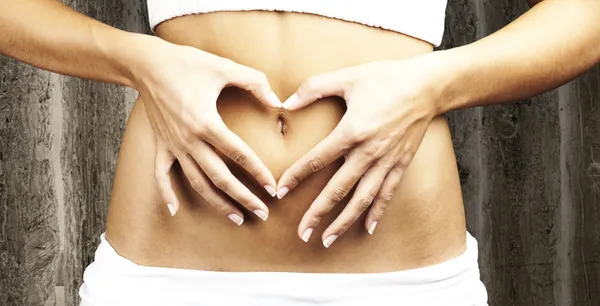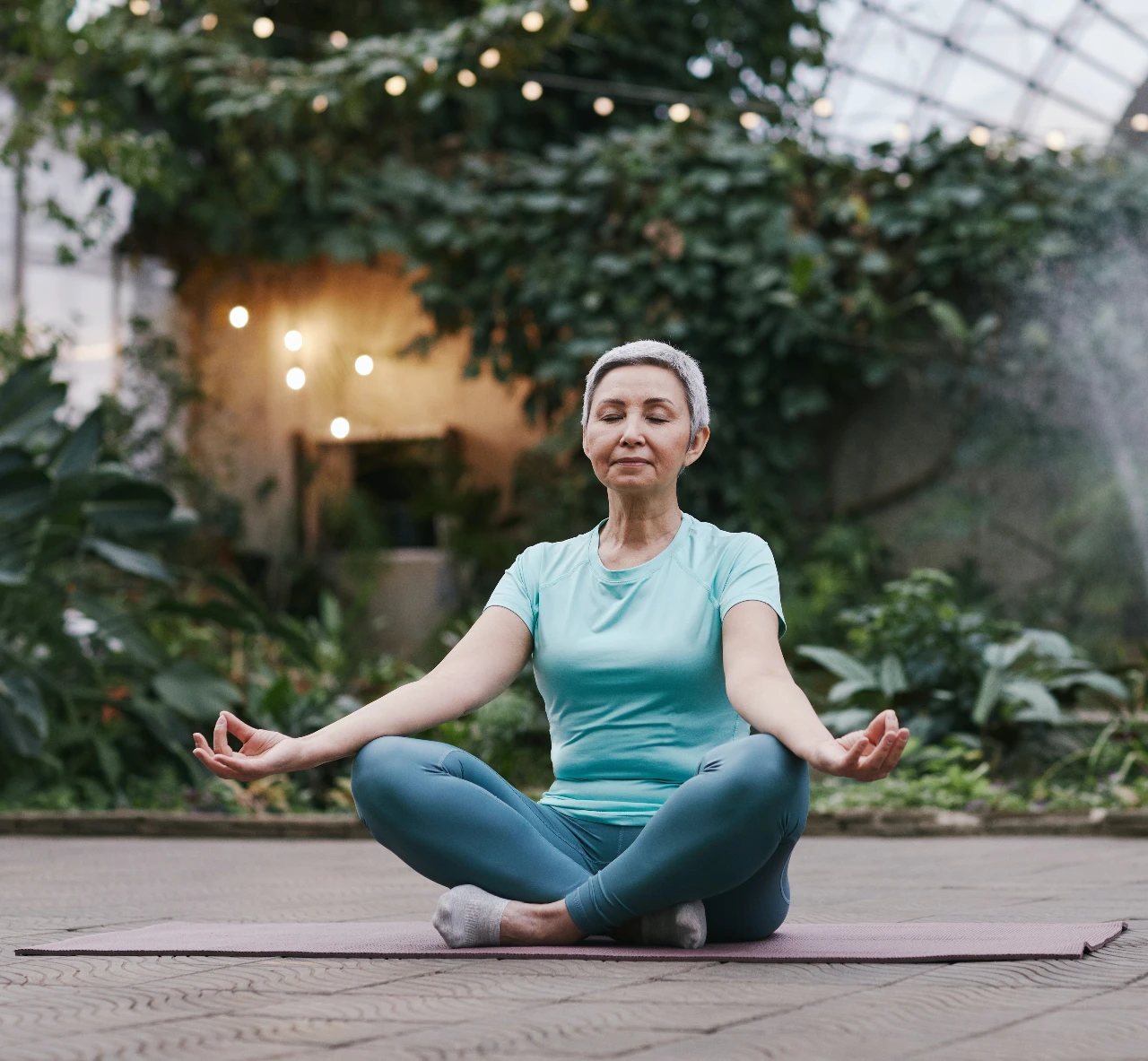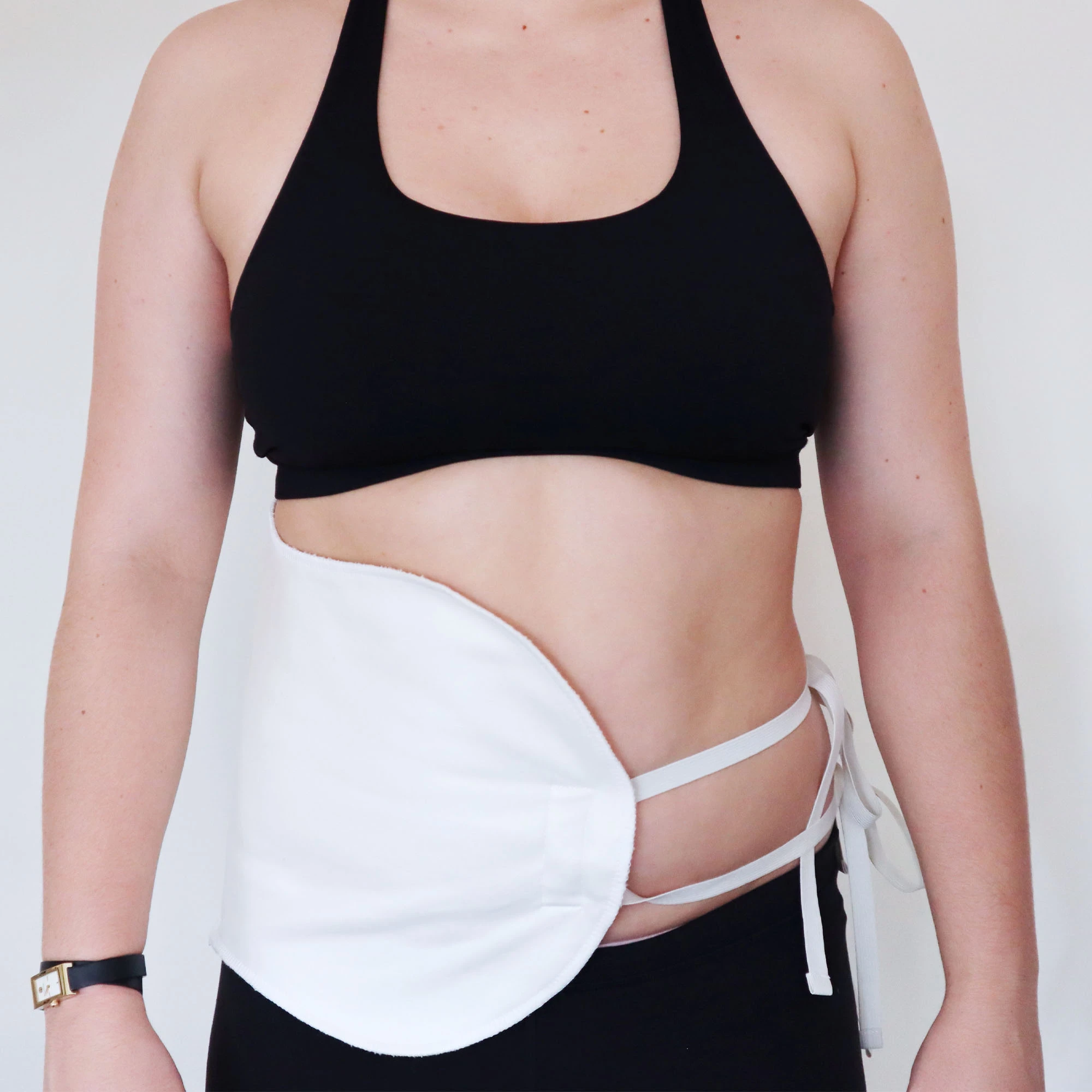
How to Reduce Stress for a Happier Gut
Medically reviewd by: Victoria Williams R.H.N.
Est reading time: 8 minutes
Simple Tips to Help Reduce Stress and Support Better Digestion
As a functional health coach, I have seen personally and professionally, how stress symptoms and sleep disorders can negatively affect our health. Knowing how to reduce stress and get deeper sleep is so important for wellbeing. In fact, stress can take a huge toll on gut health in particular. Why?
Well, your gut and brain are interconnected through the gut-brain axis, and stress can really disrupt this connection and lead to various gut-related problems. But there is an ancient tool that can help support deeper sleep and stress: Castor Oil Packs.
Let’s first look at . . .
How stress disrupts digestive balance
Cramps, bloating, and diarrhea. On top of these discomforts, stress can also slow down digestion5 which can lead to constipation and a decrease in the beneficial bacteria that helps maintain a healthy microbiome. Plus, digestive discomfort contributes to sleep disorders, and sound sleep is what you need to restore better health. It’s a vicious cycle!
One significant symptom of stress is inflammation which can cause damage to your intestinal lining – making it more permeable and prone to conditions like leaky gut4. Without some stress relief, the substances that are normally kept safely inside your intestines begin to seep out and slowly enter your bloodstream. Now, the stage is set for the vicious cycle of immune reactions and more inflammation – something you definitely want to avoid, agreed?
Overall, chronic stress can contribute to a variety of gut problems1, including irritable bowel syndrome (IBS), inflammatory bowel disease (IBD), and other digestive disorders2,4, and this is just one reason why it’s so important to learn how to reduce stress.
How to reduce stress for gut health
Reducing stress is the key, and how you choose to do this can make all the difference in your overall health and quality of life. But you’re wondering where to start, right?
Well, here are some stress relief techniques that I often recommend to my clients, and if practiced regularly, can lead to more sound sleep and fewer symptoms of stress.
Mindfulness Meditation
Also, you don’t have to sit for an hour or even a half-hour to benefit from this practice. Mindfulness meditation simply involves paying attention to the present moment without judgment or distraction. It helps to calm your mind and promote a sense of inner peace. Regular practice may even improve sleep quality6, lower blood pressure7,8, and reduce symptoms of stress, anxiety and depression8.
Start small and just try to bring your awareness to the present moment throughout the day, or dedicate just 10 minutes a day to mindfulness meditation, and gradually work your way to longer periods of practice. You can also wear a Medical Mystic Mask when you sit! It can help you center and relax for better presence!

Exercise
Healthy Diet
Deeper Sleep
Start by aiming for 7-9 hours of sound sleep each night, and create a relaxing bedtime routine to help you unwind for deep sleep. Adding the gentle compression of a Queen of the Thrones® Castor Oil Pack to your bedtime routine may help move your body into the parasympathetic ‘rest and digest’ state14-17, and may support your body in its detox and repair processes.
Self-Care
How Castor Oil Packs may support stress relief and deeper sleep
By incorporating mindfulness meditation, exercise, a healthy diet, adequate sleep, and self-care into your daily life, you’ll be well on your way to relieving stress and getting deeper sleep. But there is one self-care tool that I particularly love, because it can support relaxation, deeper sleep, and less stress easily and conveniently: Castor Oil Packs.
The use of Castor Oil dates back thousands of years. In the last 100 years, Castor Oil was poured on a piece of cotton fabric and applied to the body as a Castor Oil Pack. Using Castor Oil this way proved to be pretty messy, but Queen of the Thrones® Castor Oil Packs provide all the benefits with less mess.

How to Use Castor Oil Packs
Step 2: Place the pack over your liver area and tie it in place.
Wear for 1 hour daily or overnight.
Ideal for supporting deeper sleep, Castor Oil Packs may help stimulate the pleasure centers of your brain21, 22, 23 and may help support the production of dopamine, a feel-good hormone that helps you feel satisfied.
One enormous benefit of using Castor Oil Packs is that there are almost no known side-effects associated with them. In short, developing the use of Castor Oil Packs into your wellness routine is a smart choice. You’re providing your body with another opportunity to restore and reset which is always an important part of self-care.
As a functional health coach, I am here to support you on your wellness journey and provide you with the tools and resources you need to thrive. Visit my website to know more about how we can work together.
About the author:
Certified Functional Diagnostic Nutrition Practitioner
Board Certified Holistic Health Practitioner
Website: https://www.tiffanycagwin.com
Click here for references
2. Madison A, Kiecolt-Glaser JK. Stress, depression, diet, and the gut microbiota: human-bacteria interactions at the core of psychoneuroimmunology and nutrition. Curr Opin Behav Sci. 2019 Aug;28:105-110. doi: 10.1016/j.cobeha.2019.01.011. Epub 2019 Mar 25. PMID: 32395568; PMCID: PMC7213601.
3. Goyal M, Singh S, Sibinga EM, Gould NF, Rowland-Seymour A, Sharma R, Berger Z, Sleicher D, Maron DD, Shihab HM, Ranasinghe PD, Linn S, Saha S, Bass EB, Haythornthwaite JA. Meditation programs for psychological stress and well-being: a systematic review and meta-analysis. JAMA Intern Med. 2014 Mar;174(3):357-68. doi: 10.1001/jamainternmed.2013.13018. PMID: 24395196; PMCID: PMC4142584.
4. Bhatia V, Tandon RK. Stress and the gastrointestinal tract. J Gastroenterol Hepatol. 2005 Mar;20(3):332-9. doi: 10.1111/j.1440-1746.2004.03508.x. PMID: 15740474.
5. Chang YM, El-Zaatari M, Kao JY. Does stress induce bowel dysfunction? Expert Rev Gastroenterol Hepatol. 2014 Aug;8(6):583-5. doi: 10.1586/17474124.2014.911659. Epub 2014 May 31. PMID: 24881644; PMCID: PMC4249634.
6. Rusch HL, Rosario M, Levison LM, Olivera A, Livingston WS, Wu T, Gill JM. The effect of mindfulness meditation on sleep quality: a systematic review and meta-analysis of randomized controlled trials. Ann N Y Acad Sci. 2019 Jun;1445(1):5-16. doi: 10.1111/nyas.13996. Epub 2018 Dec 21. PMID: 30575050; PMCID: PMC6557693.
7. Park SH, Han KS. Blood Pressure Response to Meditation and Yoga: A Systematic Review and Meta-Analysis. J Altern Complement Med. 2017 Sep;23(9):685-695. doi: 10.1089/acm.2016.0234. Epub 2017 Apr 6. PMID: 28384004.
8. Bell TP. Meditative Practice Cultivates Mindfulness and Reduces Anxiety, Depression, Blood Pressure, and Heart Rate in a Diverse Sample. J Cogn Psychother. 2015;29(4):343-355. doi: 10.1891/0889-8391.29.4.343. Epub 2015 Jan 1. PMID: 32755943.
9. Schultchen D, Reichenberger J, Mittl T, Weh TRM, Smyth JM, Blechert J, Pollatos O. Bidirectional relationship of stress and affect with physical
10. Harber VJ, Sutton JR. Endorphins and exercise. Sports Med. 1984 Mar-Apr;1(2):154-71. doi: 10.2165/00007256-198401020-00004. PMID: 6091217.activity and healthy eating. Br J Health Psychol. 2019 May;24(2):315-333. doi: 10.1111/bjhp.12355. Epub 2019 Jan 22. PMID: 30672069; PMCID: PMC6767465.
11. Mader T, Chaillou T, Alves ES, Jude B, Cheng AJ, Kenne E, Mijwel S, Kurzejamska E, Vincent CT, Rundqvist H, Lanner JT. Exercise reduces intramuscular stress and counteracts muscle weakness in mice with breast cancer. J Cachexia Sarcopenia Muscle. 2022 Apr;13(2):1151-1163. doi: 10.1002/jcsm.12944. Epub 2022 Feb 15. PMID: 35170227; PMCID: PMC8978016.
12. Coletro HN, Mendonça RD, Meireles AL, Machado-Coelho GLL, Menezes MC. Ultra-processed and fresh food consumption and symptoms of anxiety and depression during the COVID – 19 pandemic: COVID Inconfidentes. Clin Nutr ESPEN. 2022 Feb;47:206-214. doi: 10.1016/j.clnesp.2021.12.013. Epub 2021 Dec 20. PMID: 35063203; PMCID: PMC8710821.
13. Becker HC. Influence of stress associated with chronic alcohol exposure on drinking. Neuropharmacology. 2017 Aug 1;122:115-126. doi: 10.1016/j.neuropharm.2017.04.028. Epub 2017 Apr 19. PMID: 28431971; PMCID: PMC5497303.
14. Walker SC1, Trotter PD2, Swaney WT2, Marshall A3, Mcglone FP4. C-tactile afferents: Cutaneous mediators of oxytocin release during affiliative tactile interactions? Neuropeptides. 2017 Aug;64:27-38. doi: 10.1016/j.npep.2017.01.001. Epub 2017 Jan 19. PMID: 28162847 https://www.ncbi.nlm.nih.gov/pubmed/281628471. 5Rolls ET et all. Representations of pleasant and painful touch in the human orbitofrontal and cingulate cortices. Cereb Cortex. 2003 Mar;13(3):308-17. PMID: 12571120 https://www.ncbi.nlm.nih.gov/pubmed/12571120
15. Francis S, Rolls ET, Bowtell R, McGlone F, O’Doherty J, Browning A, Clare S, Smith E. The representation of pleasant touch in the brain and its relationship with taste and olfactory areas. Neuroreport. 1999 Feb 25;10(3):453-9. PMID: 10208571 https://www.ncbi.nlm.nih.gov/pubmed/10208571
16. Löken LS, Wessberg J, Morrison I, McGlone F, Olausson H. Coding of pleasant touch by unmyelinated afferents in humans. Nat Neurosci. 2009 May;12(5):547-8. Epub 2009 Apr 12. PMID: 19363489 https://www.ncbi.nlm.nih.gov/pubmed/19363489
17. Boddu SH1, Alsaab H2, Umar S3, Bonam SP2, Gupta H2, Ahmed S3. Anti-inflammatory effects of a novel ricinoleic acid poloxamer gel system for transdermal delivery. Int J Pharm. 2015 Feb 1;479(1):207-11. doi: 10.1016/j.ijpharm.2014.12.051. Epub 2014 Dec 24. PMID: 25542985
18. Walker SC1, Trotter PD2, Swaney WT2, Marshall A3, Mcglone FP4. C-tactile afferents: Cutaneous mediators of oxytocin release during affiliative tactile interactions? Neuropeptides. 2017 Aug;64:27-38. doi: 10.1016/j.npep.2017.01.001. Epub 2017 Jan 19. PMID: 28162847 https://www.ncbi.nlm.nih.gov/pubmed/28162847
19. Uvnas-Moberg K1, Petersson M.[Oxytocin, a mediator of anti-stress, well-being, social interaction, growth and healing]. Z Psychosom Med Psychother. 2005;51(1):57-80. PMID: 15834840 https://www.ncbi.nlm.nih.gov/pubmed/15834840
20. Rolls ET et all. Representations of pleasant and painful touch in the human orbitofrontal and cingulate cortices. Cereb Cortex. 2003 Mar;13(3):308-17. PMID: 12571120 https://www.ncbi.nlm.nih.gov/pubmed/12571120
21. Francis S, Rolls ET, Bowtell R, McGlone F, O’Doherty J, Browning A, Clare S, Smith E. The representation of pleasant touch in the brain and its relationship with taste and olfactory areas. Neuroreport. 1999 Feb 25;10(3):453-9. PMID: 10208571 https://www.ncbi.nlm.nih.gov/pubmed/10208571
22. Löken LS, Wessberg J, Morrison I, McGlone F, Olausson H. Coding of pleasant touch by unmyelinated afferents in humans. Nat Neurosci. 2009 May;12(5):547-8. Epub 2009 Apr 12. PMID: 19363489 https://www.ncbi.nlm.nih.gov/pubmed/19363489



What are the side effects /adverse events that one can experience from the use of castor oil packimg
Castor Oil Packs may help support cleansing, drainage and detox, so drinking plenty of water when you first start your practice may be supportive as the body begins to mobilize toxins and move things out.
If you aren’t staying hydrated, some people may notice headaches, mild nausea, vivid dreams, fatigue, skin rashes, itchiness, loose stools/constipation or restless sleep in the first few days. This typically subsides after a few days as the body balances out.
You could try to start slower by using 1 hour before bed for the first week then frequent use to overnight (or longer).